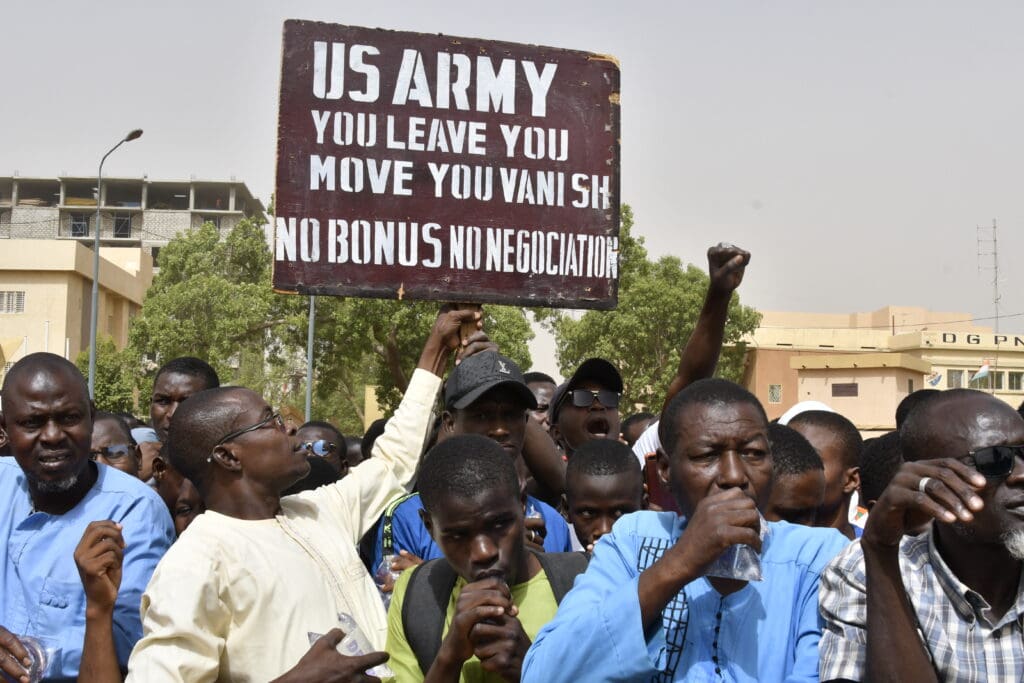When Niger’s military rulers decided to put an end to the presence of American armed forces on the country’s territory in May, the move was met with dismay in Washington. Niger, in the heart of the Sahel region south of the Sahara Desert, is host to two major bases the United States had long used to launch surveillance drones and track violent extremist organizations (VEO) as far afield as Libya, Chad, Mali, and Nigeria. U.S. Africa Command (AFRICOM) is now preparing to evacuate the bases by September 2024.
The departure of American forces from Niger is just the latest in a string of setbacks for Western powers—particularly the U.S. and France—in the Sahel. Military juntas toppled governments in Mali in 2020 and 2021, Guinea in 2021, and Burkina Faso in 2023, as well attempting and failing to topple the government of Chad in March 2024. All these countries shared similar grievances: their armed forces have been angered by persistent VEO attacks against the military and local populations, a frustration exacerbated by the failure of Western forces in the region to tackle such groups. Combined with growing public anger, this convinced the militaries to intervene and remove what they saw as incompetent civilians and foreign powers incapable of tackling terrorism.
This domino-like series of coups has caused a major geopolitical reshuffling in the Sahel. The political spillover of the putsches in Mali, Niger, and Burkina Faso by purportedly nationalistic military juntas has dramatically shifted the balance of power between international actors in the region, in ways that have implications well beyond the Sahel.
The region spans a vast, arid area from the Atlantic Ocean to the Horn of Africa. It is rich in minerals such as gold and uranium but suffers appalling socioeconomic conditions. It has seen many interventions by rival foreign powers and a high degree of instability underpinned by ethnic conflicts, internal displacement, climate change, drug trafficking, and extremist violence, in the form of Al-Qaida in the Islamic Maghreb (AQIM), Boko Haram, Al-Qaeda spinoff the Movement for Unity and Jihad in West Africa (MUJAO), and the Islamic State group, among others.
Given these escalating and interlinked crises, the Sahel’s instability affects not only the Maghreb but also Europe and the Gulf. Many of the region’s people have fled, risking their lives crossing the Sahara Desert in search of safety and better economic opportunities.
The forced withdrawal of foreign troops from the Sahel began after the second coup in Mali in 2021. The Malian new authorities, with popular support, called on foreign powers—notably France—to leave the country, followed by the United Nations Stabilization Mission MINUSMA. Forced out of Mali, Paris found a strong ally in Niger, where it installed 1,500 personnel, ostensibly to continue its antiterrorism operations in the Sahel. However, the July 2023 coup and the strong resentment from the Nigerien population compelled Paris to reconsider its presence in Niger and in the Sahel at large. Days after the July coup, thousands of pro-putsch Nigeriens demonstrated in front of the French embassy in Niamey, condemning France’s purported neocolonial behavior, and in some cases waving Russian flags (although there was no evidence of Russian involvement in the coup, which the Kremlin had officially condemned).
Since then, Niger has been embroiled in a complex crisis with momentous consequences for the region. Niamey’s new rulers gave 600 American troops until September 14, 2024, to leave the country, canceling a deal they argued was “not only profoundly unfair in its substance but it also does not meet the aspirations and interests of the Nigerien people.” That brings to an end a five-year U.S. presence at the Niger Air Base 201, a strategically vital drone hub in the country’s north. The Nigerien junta’s demand for the withdrawal of U.S. troops also suggests that it is likely to rely on new foreign backers such as Russia, China or Türkiye, creating a new geopolitical reality and reflecting the weakening of Western hegemony in the region.
The spillover effect threatens to spread eastwards to neighboring Chad, for decades Paris’ ally par excellence. In April 2024, the Chadian air force decided to end all operations with the U.S. military, which has 100 troops stationed in N’Djamena, and in January its president, Mahamat Idriss Déby, met Russian President Vladimir Putin at the Kremlin.
With the decline of Western influence in the Sahel, major actors such as Russia, China, Türkiye, Iran, and the United Arab Emirates are playing greater roles and advancing their security and economic interests, by building ties with the region’s new leaders. Africa has thus become the theater of renewed great power rivalries, reminiscent of the Cold War. Though driven by economic interests, Russia has played a greater role in security issues. The Sahel offers Moscow an opportunity to reestablish the presence and prestige that the Soviet Union once enjoyed. Since the 2010s, Moscow has strengthened its presence in Africa, signing numerous agreements with African states and attempting to secure military bases there. In the Sahel, Moscow has relied on the mercenary Wagner Group—now reconstituted as Russia’s Africa Corps—which deployed in Burkina Faso after the coup and is present in Mali, Libya, and in the Central African Republic (CAR) to assist the incumbent regimes in the fight against militants.
China has also developed a weighty economic presence in Africa since the late 1980s. Although it talks up development cooperation, its policy is also driven by the need to secure raw materials for its own economic growth. China has invested in uranium in Niger, challenging France’s virtual monopoly over the sector, which accounts for about 7 percent of the world’s uranium production. Iran and Russia are also seeking deals with Niger to boost their uranium enrichment capabilities. Niger and Iran have shown signs of rapprochement since the coup of July 2023, and Niamey appears willing to sell hundreds of tons of refined uranium or “yellowcake” to Tehran.
Like Mali, Niger has also sizable gold mines. Generally, China is interested in accessing both metals as well as other mineral resources and has invested heavily in Niger, particularly in oil and uranium over the past two decades.
The UAE has also boosted its activity in the region. While some regard its presence with suspicion due to its deployments of troops and supplies of powerful weapons and drones, Abu Dhabi insists that its policy aims “to enhance security and stability in the Sahel nations, as well as to advance development and humanitarian efforts in the region.”
The changes underway in the Sahel will have serious implications for the Maghreb and beyond. For Algeria, the stability of its southern, 951-kilometer (591-mile) border with Niger is vital, not only because of the threats of transborder terrorism and organized crime but also because of the potential impact on Algeria’s vast investments in various regional projects. These include the 4,100-kilometer Trans-Saharan Gas Pipeline to export Nigerian natural gas to Europe via Niger and Algeria, and the nearly completed 4,800-kilometer Trans-Saharan Highway linking Algiers to Lagos, also via Niger. Conflict or ongoing instability would jeopardize these projects and the political, economic, and security relations that Algeria has built up over the years with its Sahelian neighbors, as well as accelerating flows of migrants onto its territory in their attempts to reach Europe.
Instability in the Sahel stems not only from socioeconomic conditions, climate change, and conflict but also from the nature of new military regimes themselves. Despite their nationalist and populist slogans, they suffer from profound naivety and lack any vision for the long term. In Mali, tensions have emerged between the junta and Prime Minister Choguel Maïga and his civilian associates, who oppose the possibility of keeping the colonels in power for several more years and their elevation to the rank of general. The Alliance of Sahel States, created in September 2023 by the juntas of Burkina Faso, Mali, and Niger as the foundation of a larger confederation, and their attempt in February 2024 to create a common currency in order “to end colonization,” are likely utopian endeavors. Furthermore, the German-funded joint military exercises between the three, together with Chad and Togo, to allegedly fight jihadists in the Sahel might be futile and further complicate the security situation in the region.
The major risk of this ongoing geopolitical reshuffling is that these juntas may become simple pawns rather than actors with real agency. They lack a strategy and strategic vision able to ensure the security needed for economic development and stability in the region. This could leave the door open to a new scramble for Africa—with the Sahel as the main entrance.



